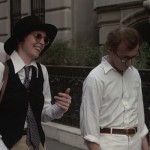Happy-Go-Lucky Review
“Happy-Go-Lucky” is one of the best pure character studies in recent memory. This is essentially a film with no plot–not a flimsy plot; I mean no plot to speak of. Director Mike Leigh just throws this wacky individual at us and asks us to care about her. And thanks to the brilliant work of Sally Hawkins, we actually do. Her Poppy is grating at times, but incredibly sincere, which makes for a fun journey. But like the last Leigh film I watched, “Secrets and Lies,” you are lured in for what turns out to be a brutal final act. It’s the surprise of where this film goes, and the dramatic heft of the conclusion, that elevates it from light and goofy to interesting and impactful.
Not easy to do a plot description for this film, but here goes nothing. Poppy (Sally Hawkins) is a pre-school teacher in Britain. She’s also deliriously cheerful. During the course of the film, she goes to work, loses her bike, goes out with her friends, dances the flamenco, and takes driving lessons. The latter activity introduces her to Scott (Eddie Marsan), her miserable driving instructor. He’s just an absolute drag. As the lessons go on, she begins to spot Scott around town, yet he grows increasingly hostile toward one another. So Poppy sets out to find out what makes Scott tick.
Because this is a character study, much of the film’s success hinges on the performances of these characters. Sally Hawkins won a Golden Globe for her work, and it was incredibly well-deserved. She’s grating for quite a while, but somewhere along the way, she grows on you and starts to look more like a human being, rather than a live British version of the Energizer Bunny. She’s definitely one of the most bizarre characters of 2008, but she’s different and fun to watch. The film’s climax reveals a lot about her and her way of life, and in that scene, she shows us more than most actresses do in entire films.
Her co-star, Marsan, is just as good, albeit in a completely different way. He’s pathetic, socially backward, and very odd, but we feel bad for him. Again, I’ll hearken back to the film’s conclusion. He changes our mind about him, and while we might not like him per se, we certainly pity him and we understand much of his behavior. It’s equal parts scary and heartbreaking, and the way these two fine actors interact with each other is a sight to behold.
The film’s pacing is deliberate. Not much happens, but Leigh intends it to be this way. There’s a reason behind every scene. Everything Poppy does takes her one step closer to the conclusion and the major points Leigh is trying to make. One of the reasons I love Leigh as a filmmaker so much is the way he does this. He can bore you to tears with something, but once the film ends, you realize just how important that moment was to the film as a whole. It’s the reason his films stick with you for so long, and it’s the reason I’m so excited for “Another Year†later in 2010.
I wish more people got to see this film when it was released. It ended up being completely ignored by the Oscars, despite its worthiness in many categories, especially Actress and Supporting Actor. I’ll always remember it fondly, though, no matter how few share that sentiment.
















